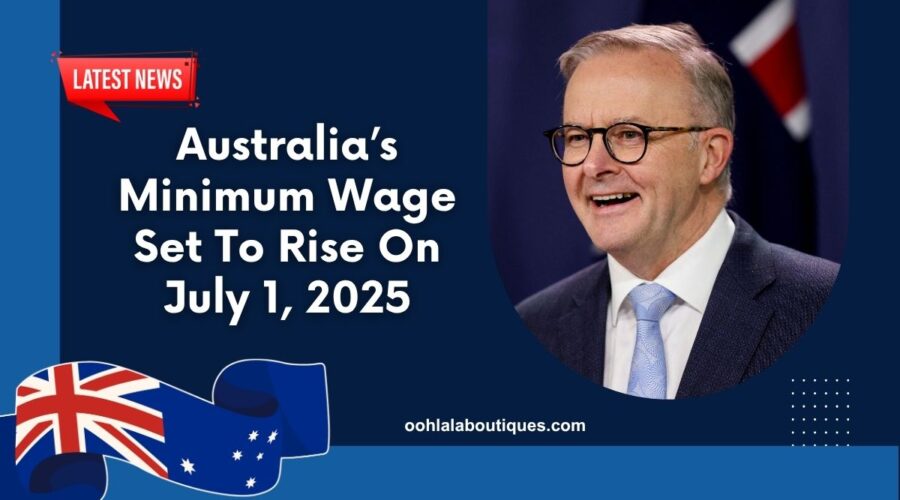Australia’s Minimum Wage Set To Rise On July 1, 2025 – What You Need To Know!
Australia’s minimum wage is set for a rise starting July 1, 2025. This change marks a significant shift in the wages of many workers across the country. If you’re employed in Australia, it’s important to understand how this new wage increase will impact you.
Whether you’re covered by an award, registered agreement, or receive the National Minimum Wage, these adjustments will have a direct effect on your earnings.
This article provides all the essential details, including new wage rates, how to prepare, and comparisons with other countries’ minimum wage standards.
What Will the New Minimum Wage Be in Australia?
From July 1, 2025, the National Minimum Wage will increase to $948 per week or $24.95 per hour, based on a full-time, 38-hour workweek. This is an increase from the current $915.90 per week or $24.10 per hour.
This increase applies to employees who are not covered by an award or registered agreement. For workers covered by awards, which are legal documents that outline minimum pay rates and conditions for various industries, the wage increase will be 3.5%.
Here’s a breakdown of the new rates:
| Category | Current Rate (2025) | New Rate from July 1, 2025 |
|---|---|---|
| National Minimum Wage (full-time, 38 hours) | $915.90 per week, $24.10 per hour | $948 per week, $24.95 per hour |
| Award Wage Increase | – | +3.5% increase |
How Will This Affect Your Pay?
If you are impacted by this increase, your employer is required to adjust your pay to reflect the new rates starting with the first full pay period after July 1, 2025.
For example, if your pay period starts on Wednesday, the new rates will apply from Wednesday, July 2, 2025. If your pay period begins on a different day, the new rates will take effect from the next pay period following July 1, 2025.
Do You Need to Do Anything?
The increase will be automatically applied by your employer if you are eligible. However, it is always a good idea to ensure that everything is in order by following these steps:
- Use the Pay and Conditions Tool (P.A.C.T.): You can use P.A.C.T. to calculate your pay and check your entitlements to ensure that you are being paid correctly.
- Check Your Award: Visit the Awards webpage for more details on the award system and to confirm which award applies to your work.
- Discuss With Your Employer: If you have any questions or concerns about the changes, talk to your employer directly or contact the Fair Work Ombudsman for further assistance.
How Does Australia’s Minimum Wage Compare to Other Countries?
Australia’s minimum wage is among the higher rates globally. Here’s a comparison with some other popular study destinations for international students:
| Country | Minimum Wage (as of 2025) | International Student Work Hours |
|---|---|---|
| Australia | $24.95 per hour | 24 hours per week during semesters; unlimited during holidays |
| USA | $7.25 per hour (federal) | 20 hours per week during semesters; up to 40 hours during holidays |
| UK | £10 per hour (18-20); £12.21 (21+) | 20 hours per week during semesters |
| Canada | CAD $15.00 – CAD $19.00 per hour (varies by province) | 24 hours per week off-campus without a work permit |
As you can see, Australia offers one of the highest minimum wages among these countries, making it an attractive destination for workers and international students alike.
Why the Increase?
The wage increase comes as part of the government’s annual review of the National Minimum Wage, aimed at ensuring that workers can keep pace with the cost of living. The increase will also help ensure that the wage rate remains fair and equitable for workers across different sectors.
In recent years, rising costs of living have been a major concern for many employees, especially in urban centers where housing, transportation, and daily expenses are rising. The government has taken these factors into account when setting the new wage rates.
The Role of Awards in Setting Wages
For workers who are covered by awards, such as those in hospitality, retail, or healthcare, the wage increase will be 3.5% across all awards. These increases will be reflected in pay rates from the first full pay period on or after July 1, 2025.
Awards set specific wages and conditions for different industries and occupations. If you’re unsure which award applies to you, you can use the Find My Award tool provided by the Fair Work Ombudsman to get more clarity.
Australia’s minimum wage increase is a positive step towards improving the lives of employees across the country. Starting on July 1, 2025, workers will see a rise in their hourly rates and weekly pay, making it easier to manage rising costs.
Whether you’re covered by the National Minimum Wage or an award, understanding the new rates and how they apply to your situation will ensure you’re prepared for the change.
Take action now by reviewing your entitlements and speaking with your employer to ensure everything is in order. The wage increase reflects the ongoing efforts to maintain a fair and sustainable standard of living for workers across Australia.
FAQs
What is the new National Minimum Wage in Australia for July 2025?
The new National Minimum Wage will be $24.95 per hour, or $948 per week based on a 38-hour workweek.
How will the increase affect employees covered by awards?
Employees covered by awards will see a 3.5% wage increase in their pay rates, effective from the first full pay period on or after July 1, 2025.
Do I need to do anything to receive the new wage increase?
If you’re eligible, your employer will automatically apply the new rates. You can use the Pay and Conditions Tool (P.A.C.T.) to check your entitlements and ensure you’re being paid correctly.

Leave a Reply Cancel reply